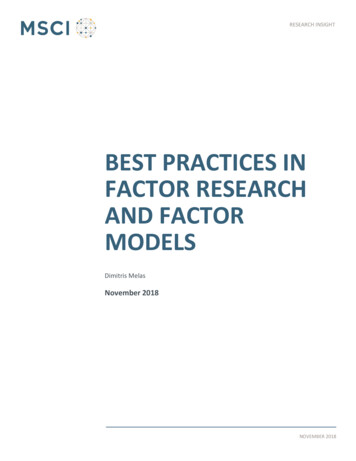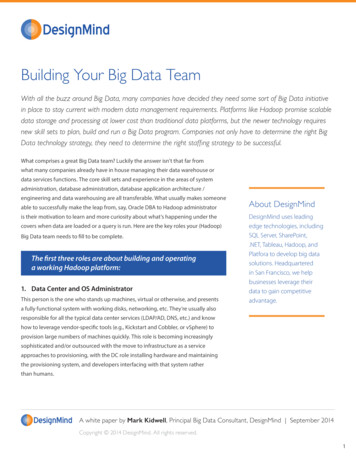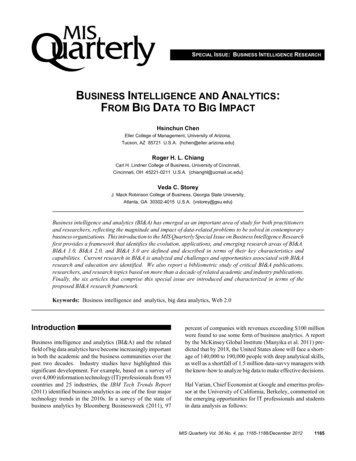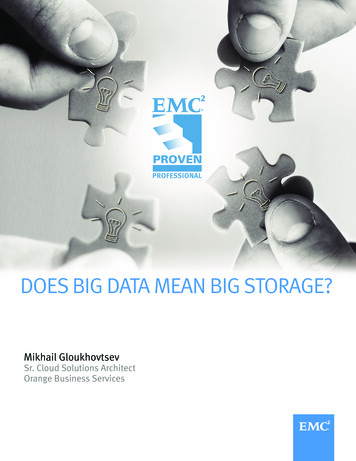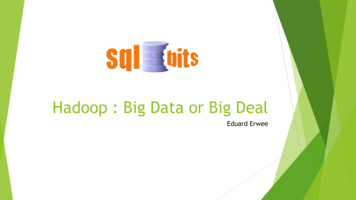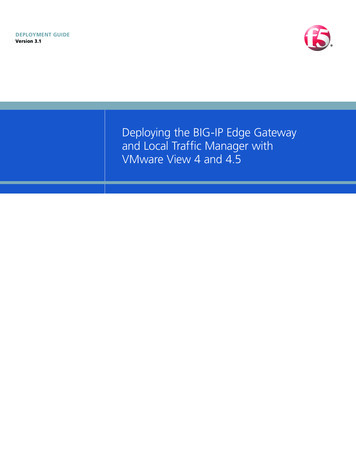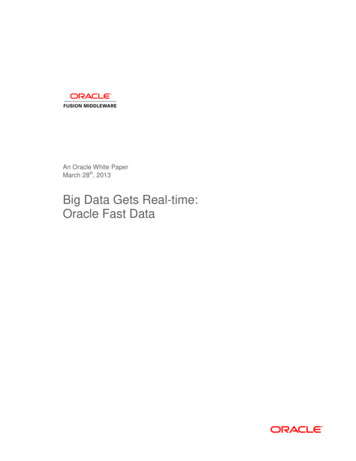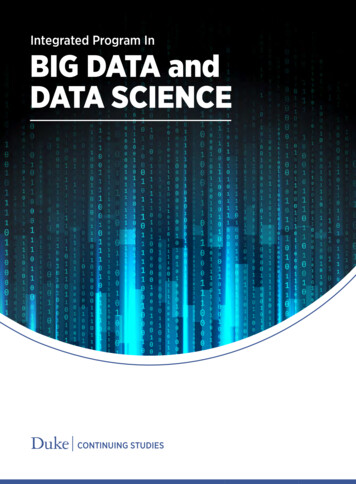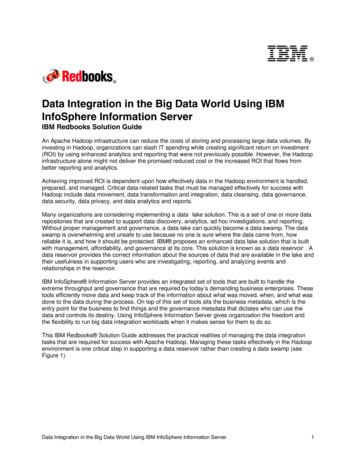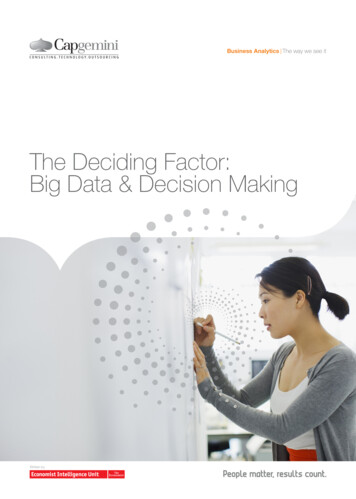
Transcription
Business Analytics The way we see itThe Deciding Factor:Big Data & Decision MakingWritten by
The Deciding Factor: Big data and decision-makingForewordBig Data represents a fundamental shift in business decisionmaking. Organisations are accustomed to analysing internaldata – sales, shipments, inventory. Now they are increasinglyanalysing external data too, gaining new insights intocustomers, markets, supply chains and operations: theperspective that Capgemini calls the “outside-in view”. Webelieve it is Big Data and the outside-in view that will generatethe biggest opportunities for differentiation over the next fiveto ten years.The topic of Big Data has been rising rapidly up ourclients’ agenda, and Capgemini is already undertakingextensive work in this area all over the world. That is why wecommissioned this survey from the Economist IntelligenceUnit: we wanted to find out more about how organisations areusing Big Data today, where and how it is making a difference,and how it will be used in the future.The results show that organisations have already seenclear evidence of the benefits Big Data can deliver. Surveyparticipants estimate that, for processes where Big Dataanalytics has been applied, on average, they have seen a 26%improvement in performance over the past three years, andthey expect it will improve by 41% over the next three.2The survey also highlights special challenges for decisionmaking arising from Big Data; although 85% of respondentsfelt the issue was not so much volume as the need to analyseand act on Big Data in real-time. Familiar challenges relatingto data quality, governance and consistency also remainrelevant, with 56% of respondents citing organisational silosas their biggest problem in making better use of Big Data.For our respondents, data is now the fourth factor ofproduction, as essential as land, labour and capital. It followsthat tomorrow’s winners will be the organisations that succeedin exploiting Big Data, for example by applying advancedpredictive analytic techniques in real time.I would like to thank the teams at the Economist IntelligenceUnit and within Capgemini, along with all the surveyrespondents and interviewees. I believe this research will domuch to increase understanding the business impact of BigData and its value to decision-makers.Paul NannettiGlobal Sales and Portfolio Director
The Deciding Factor: Big data and decision-makingAbout the ResearchCapgemini commissioned theEconomist Intelligence Unit to write TheDeciding Factor: Big data and decisionmaking.The report is based on the followingresearch activities:The Economist Intelligence Unitconducted a survey, completed inFebruary 2012, of 607 executives.Participants hailed from across theglobe, with 38% based in Europe, 28%in North America, 25% in Asia-Pacificand the remainder coming from LatinAmerica and the Middle East andAfrica. The sample was senior, 43% ofparticipants being C-level and boardexecutives and the balance—otherhigh-level managers such as vicepresidents, business unit heads anddepartment heads. Respondentsworked in a variety of different functionsand hailed from over 20 industries.Of the latter, the best representedwere financial services, professionalservices, technology, manufacturing,healthcare and pharmaceuticals,and consumers goods and retail.To supplement the survey, theEconomist Intelligence Unit conducteda programme of interviews withsenior executives of organisationsas well as independent expertson data and decision-making.Sincere thanks go to the surveyparticipants and interviewees forsharing their valuable time and insights.343%of participants are C-leveland board executives
The Deciding Factor: Big data and decision-makingExecutive summaryWhen it comes to making businessdecisions, it is difficult to exaggeratethe value of managers’ experienceand intuition, especially when harddata is not at hand. Today, however,when petabytes of informationare freely available, it would befoolhardy to make a decisionwithout attempting to draw somemeaningful inferences from the data.Anecdotal and other evidence isindeed growing that the intensive useof data in decision-making can leadto better decisions and improvedbusiness performance. One academicstudy cited in this report found that,controlling for other variables, firmsthat emphasise decision-making basedon data and analytics have performed5-6% better—as measured by outputand performance—than firms thatrely on intuition and experience fordecision-making. Although that studyexamined “the direct connectionbetween data-driven decision-makingand firm performance”, it did notquestion the size of the data-setsused in decision-making. In fact, verylittle has been written about the useof “big data”—which is distinguishedas much by its large volume as bythe variety of media which generateit—for decision-making. This report isan attempt to address that shortfall.The research confirms a growingappetite among organisations for dataand data-driven decisions, despite theirstruggles with the enormous volumesbeing generated. Just over half ofexecutives surveyed for the report saythat management decisions basedpurely on intuition or experience areincreasingly regarded as suspect, andtwo-thirds insist that managementdecisions are increasingly based on“hard analytic information”. Nine inten of the executives polled feel thatthe decisions they’ve made in the pastthree years would have been better ifthey’d had all the relevant data to hand.4At the same time, practitionersinterviewed for the report—allenthusiastic about the potentialfor big data to improve decisionmaking—caution that responsibilityfor certain types of decisions, evenoperational ones, will always needto rest with a human being.Other findings from the researchinclude the following:The majority of executivesbelieve their organisationsto be “data driven”,but doubts persist.Fully two-thirds of survey respondentssay that the collection and analysis ofdata underpins their firm’s businessstrategy and day-to-day decisionmaking. The proportion of executiveswho say their firm is data-driven ishigher in the energy and naturalresources (76%), financial services(73%), and healthcare, pharmaceuticalsand biotechnology sectors (75%).They may not be as data-savvy astheir executives think, however:majorities also believe that big datamanagement is not viewed strategicallyat their firm, and that they do not haveenough of a “big data culture”.Organisations struggleto make effective useof unstructured datafor decision-making.Notwithstanding the heavy volumes,one-half of executives say they donot have enough structured data tosupport decision-making, comparedwith only 28% who say the same aboutunstructured data. In fact, 40% ofrespondents complain that they havetoo much unstructured data. Mostbusiness people are familiar withspreadsheets and relational databases,but less familiar with the tools used toquery unstructured data, such as textanalytics and sentiment analysis. Alarge number of executives protest thatunstructured content in big data is toodifficult to interpret.Although unstructured datacauses unease, social mediaare growing in importance.Social media tell companies notonly what consumers like but, moreimportantly, also what they don’tlike. They are often used as an earlywarning system to alert firms whencustomers are turning against them.Forty-three percent of respondentsagree that using social media to makedecisions is increasingly important.For consumer goods and retail,manufacturing, and healthcare andpharmaceuticals firms, social mediaprovide the second most valueddatasets after business activity data.The job of automatingdecision-making isfar from over.Automation has come a long way, but amajority of surveyed executives (62%)believe there are many more typesof operational and tactical decisionsthat are yet to be automated. Thisis particularly true of heavy industrywhere regulation and technology haveheld automation back. There is, to besure, a limit to the decisions that can beautomated. Although technical limitsare constantly being overcome, theincreasing demand for accountability—especially following the financialcrisis—means that important businessdecisions must ultimately rest with ahuman, not a machine. For less criticalor risky decisions, however, there is stillmuch scope for decision-automation.
The Deciding Factor: Big data and decision-makingThis is particularly true of machineto-machine communication, wherelow-risk decisions, such as whether toreplenish a vending machine or not, willincreasingly be made without humanintervention.Organisational silosand a dearth of dataspecialists are the mainobstacles to putting bigdata to work effectivelyfor decision-making.Data silos are a perennial problem,and one which the business processreengineering revolution of the1990s failed to resolve. Regulationand the emergence of “trusted dataaggregators” may help to break downtoday’s application silos, however.Arguably a longer term challenge isthe lack of skilled analysts. Technologyfirms are working with universities tohelp train tomorrow’s data specialists,but it is unlikely that supply willmeet demand soon. In the nearfuture, there is likely to be a “war fortalent” as firms try and outbid eachother for top-flight data analysts.5
The Deciding Factor: Big data and decision-makingIntroduction26%Moneyball: The Art of Winning an UnfairGame, by Michael Lewis, is the story ofan underperforming American baseballteam—the Oakland Athletics—thatturned a losing streak into a winningstreak by intensively using statistics andanalytics. According to the New YorkTimes, the book turned many businesspeople into “empirical evangelists”1.41%An Economist Intelligence Unit survey,supported by Capgemini, of 607 seniorexecutives conducted for this reportfound that there is indeed a growingappetite for fact-based decisionmaking in organisations. The majorityof respondents to the survey (54%) saythat management decisions basedpurely on intuition or experience areincreasingly regarded as suspect (thisview is held even more firmly in themanufacturing, energy and governmentsectors), and 65% assert that moreand more, management decisions arebased on “hard analytic information”.is the extent of performanceimprovement alreadyexperienced from big data.is the performanceimprovement expectedin the next three years.55%say that big datamanagement is not viewedstrategically at senior levelsof their l recently there was scant researchto back the Moneyball hypothesis—thatif organisations relied on analytics fordecision-making they could outperformtheir competitors. In 2011, however,Erik Brynjolfsson, an economist at theSloan School of Management at theMassachusetts Institute of Technology(MIT), along with other colleaguesstudied 179 large publicly tradedfirms and found that, controlling forother variables, such as informationtechnology (IT) investment, labour andcapital, firms that emphasise decisionmaking based on data and analyticsperformed 5-6% better—as measuredby output and performance—thanthose that rely on intuition andexperience for decision-making2.Brynjolfsson, Erik, Hitt, Lorin M. and Kim, HeekyungHellen, “Strength in Numbers: How Does Data-DrivenDecision making Affect Firm Performance?” (April 22,2011). Available at SSRN: http://ssrn.com/abstract 1819486or http://dx.doi.org/10.2139/ssrn.18194866Two-thirds of the executives in thesurvey describe their firm as “datadriven”. That figure rises to 73%for respondents from the financialservices sector, 75% from healthcare,pharmaceuticals and biotechnology,and 76% from energy and naturalresources. Although financial servicesand healthcare firms have long beenbig data users—where big data isdefined by its enormous volumeand the great diversity of mediawhich generate it—heavy industryappears to be catching up (see casestudy: GE—the industrial Internet).Nine in ten survey respondents agreethat data is now an essential factor ofproduction, alongside land, labour andcapital. They are also optimistic aboutthe benefits of big data. On average,survey participants say that big datahas improved their organisations’performance in the past three yearsby 26%, and they are optimistic thatit will improve performance by anaverage of 41% in the next threeyears. While “performance” in thisinstance is not rigorously specified,it is a useful gauge of mood.One may question whether thesurveyed firms are as “data-driven”as their executives say. The researchalso shows that organisations arestruggling with the enormous volumesof data and often with poor qualitydata, and many are struggling to freedata from organisational silos. Thesame share of respondents who saytheir firms are data-driven also saythere is not enough of a “big dataculture” in their organisation; almostas many – 55% – say that big datamanagement is not viewed strategicallyat senior levels of their organisation.When it comes to integrating big datawith executive decision-making, thereis clearly a long road to travel beforethe results match the optimism. Thisreport will examine how far down thatroad firms in different industries andregions are, and will shed light on thesteps some organisations are taking tomake big data a critical success factorin the decision-making process.
The Deciding Factor: Big data and decision-makingOn average, respondents believe that big data will improve organisationalperformance by 41% over the next three yearsSurvey Question: Approximately to what extent do you believe that the use of big data has improved yourorganisation’s overall performance already, and can improve overall performance in the next three years?Now3 ntCFO/TreasurerCIO/CTO
The Deciding Factor: Big data and decision-makingOverall, 55% of respondents state that they feel big data management is not vieweds
participants estimate that, for processes where Big Data analytics has been applied, on average, they have seen a 26% improvement in performance over the past three years, and they expect it will improve by 41% over the next three. The survey also highlights special challenges for decision-making arising from Big Data; although 85% of respondents felt the issue was not so much volume as the .
